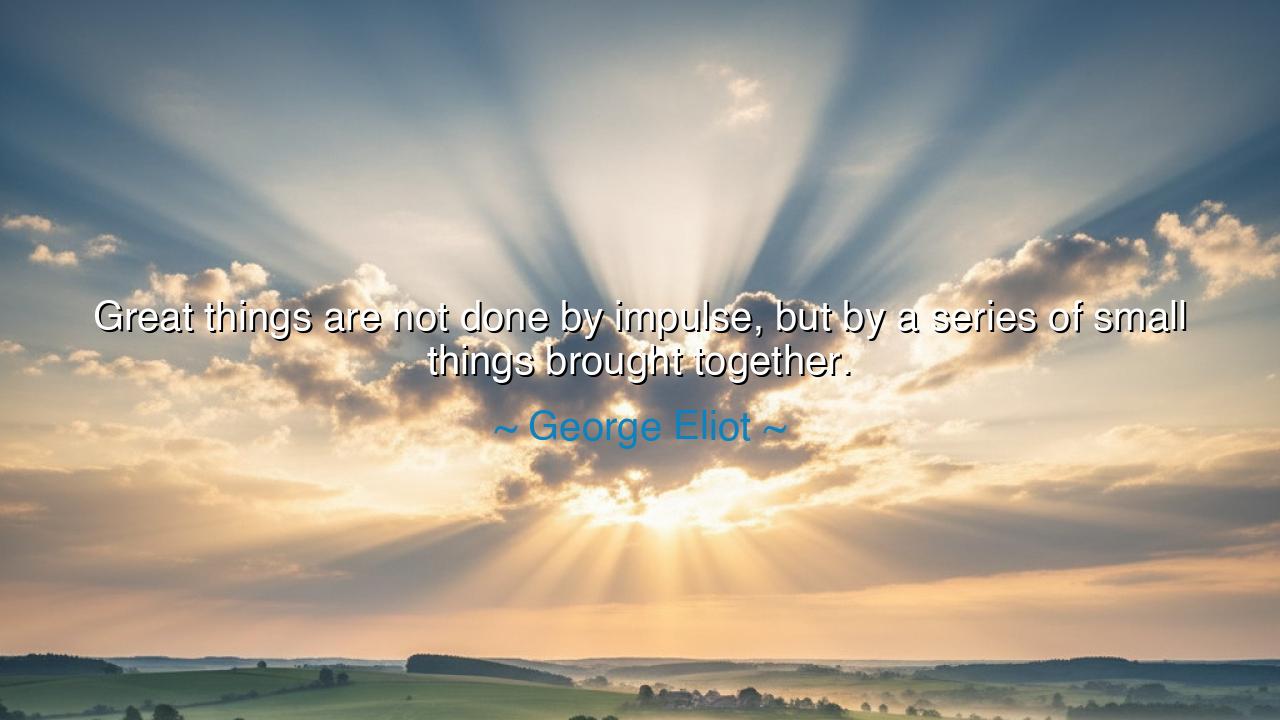
Great things are not done by impulse, but by a series of small
Great things are not done by impulse, but by a series of small things brought together.






“Great things are not done by impulse, but by a series of small things brought together.” Thus wrote George Eliot, the wise and reflective pen name of Mary Ann Evans — a woman of profound thought and unshakable realism, whose words have echoed through generations. In this saying, she reveals a truth as eternal as the rising sun: that greatness is not a lightning strike, but a sunrise — slow, steady, inevitable, and composed of countless rays of effort. For in the heart of every enduring creation, whether a masterpiece of art, a life well-lived, or a nation built from dust, there lies no single act of brilliance, but a thousand small labors joined in harmony.
Eliot lived in the nineteenth century, an age of rapid change — of industry, invention, and revolution. Yet amidst this storm of speed and progress, she called humanity back to the virtues of patience, perseverance, and thoughtful creation. She knew that the world often glorifies the impulse, the sudden genius, the dramatic act that seems to alter destiny in a heartbeat. But she also knew that behind every “miracle” stands a long unseen story of discipline and detail — the quiet accumulation of small deeds that build toward the extraordinary. Her words are not merely literary wisdom, but moral counsel: to those who seek greatness, she says, learn to cherish the small.
The meaning of this quote reaches beyond work and art; it speaks to the very rhythm of life itself. The tree does not spring fully grown from the soil; it rises through seasons of sun and storm. The sculptor’s statue is not born from a single blow, but from a thousand careful cuts. The loving heart, too, is not forged in a single act of kindness, but in years of small mercies and steady devotion. Thus, the small things — often unnoticed, often uncelebrated — are the true architects of greatness. Impulse may begin the journey, but perseverance builds the destination.
Consider the life of Florence Nightingale, the “Lady with the Lamp,” who transformed the face of modern nursing. Her work began not with a grand gesture, but with small acts of care — tending to wounded soldiers, improving cleanliness, taking records of illness and recovery. Each modest action was a single thread; together they wove a revolution in medicine. She did not wait for the perfect moment or miracle; she did what she could, where she was, with what she had. And so her patient accumulation of small deeds became a great thing — a legacy that still shines today.
This truth also finds its echo in the natural world. The river carves the canyon not by force but by persistence. The mountain is not raised by a single quake, but by countless pressures over ages. Even the light of the stars that guides sailors home travels through the vastness of time before it reaches our eyes. All greatness, then, is a symphony of small things brought together, harmonized through endurance. The impulse may inspire, but it is the steady hand that completes the work.
Eliot’s wisdom offers not only inspiration but also humility. It reminds us that what is small is not insignificant, and that the greatest monuments are built from the smallest stones. In an age that glorifies speed and spectacle, her words call us to a deeper patience — to honor the slow, to tend the details, and to trust in the quiet unfolding of effort. For the hurried spirit burns bright and fades quickly, but the steadfast spirit endures like the flame of an oil lamp, steady against the wind.
Therefore, O seeker of purpose, let this teaching be your compass: do not despise small beginnings. Every step, every act, every hour of labor adds to the whole. Do not wait for greatness to strike like lightning — build it, patiently, as the mason builds a temple stone by stone. In work, in art, in love, bring together your small moments with care and intention, and soon they will form something vast and lasting.
For as George Eliot teaches, impulse ignites, but perseverance creates. The soul that learns this truth will not be swayed by impatience or defeat, but will rise each day to lay one more brick upon the foundation of its dream. And when, at last, the great thing stands complete — when the world beholds the beauty that was long being built — the wise will know it was not born in a single act of impulse, but in the sacred joining of many small things, done with faith and love.






AAdministratorAdministrator
Welcome, honored guests. Please leave a comment, we will respond soon